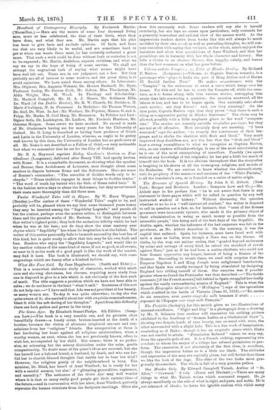beautifully drawn—a lonely sister, broken-hearted at the death of a
exhibited in the Academy of "Roman Ladies at a Gladiatorial Show "), brother, becomes the victim of alternate misplaced censure and con- showing two female heads of rare beauty, one crowned with stars, the &dation& from her " religious " friends. Her exasperation at these is other surrounded with a slight halo. This is a fine work of imagination, Last hardening her heart against all religious ministrations, when a reminding us of Blake ; though it has an exquisite grace which Blake worthy woman, an aunt, whom she has not previously known, offers to was not careful to attain. "Permission Refused" comes, we may say, visit her, accompanied by her child. She comes; there is no profes_ from the opposite polo of art. It is a French etching, representing two eion, no scheming, but the misery diminishes under the calm, gentle acrobats to whom the mayor of a village has refused permission to per- companionship. No doubt some of the guest's ideas are unusual; but she form. The execution, if not absolutely of the first class, is excellent, has herself lost a beloved friend, a husband, by death, and who can for- though the impression before us is a little too black. The attitudes bid her to cherish blessed thoughts that enable her to bear her trial ? and expression of the men are capitally given, but still better than these However, the religious gossip of the neighbourhood is busy. The we like the look of the dogs. The older of the two looks most gra- minister, Dr. Blind, has heard of Aunt Winifred; he is ready for her Pbically disconsolate. The whole is full of a very genuine pathos. with a careful sermon, but alas ! of "glittering generalities, vagueness, One Maiden Only. By Edward Campbell Taineh, Author of " St. and unreality." The authoress of the Gates Ajar may well wonder Alice," "Crowned." 3 vols. (Hurst and Blackett.)—There are many where it is that so many really good people get their current ideas of things in what Mr. Tainsh writes which command respect. He is the future —and in conversation with her niece, Aunt Winifred, patiently always manifestly on the aide of what is right, and pure, and noble. He is separates the human crotchets from the Scripture teachings. Often she not ashamed of ideals; he hates the ignoble realism with which many Handbook of Contemporary Biography. By Frederick Martiu. does this extremely well. Some readers will say she is herself (Macmillan.) — Here are the names of some four thousand living crotchetty, but she lays no stress upon particulars, only contends for men, more or less celebrated, the date of their birth, what they a generally benevolent and rational view of the unseen world. As the have done, and what they are. Mr. Martin says that his plan impressions readers derive front books like this will always be much has been to give facts and exclude opinions. Of facts, and facts modified by their own moods as well as prevailing thoughts, wo will con-


































 Previous page
Previous page